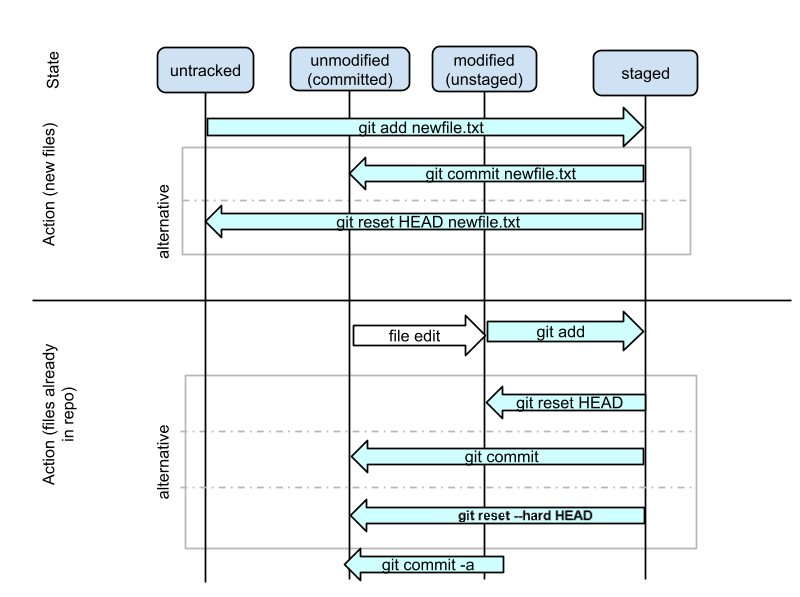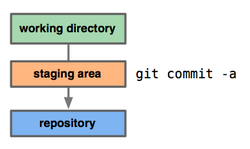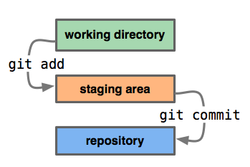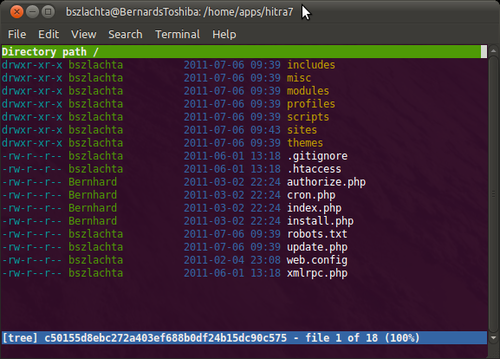Git - Working Locally
Jump to navigation
Jump to search
Git Locally
- Git as an extension to the file system
- No network required
- Repository deleted if .git folder is deleted
Initializing a repository for existing files
git init git add . git commit
Setting Up Username
git config --global user.name "Bernard" git config --global user.email b@noblepog.com
Browsing Repository
git show rev:file git show rev:directory git show rev
Basic Commands
git add file git rm file git mv file
Moving Files
git mv afile.txt movedfile.txt # equivalent to mv afile.txt movedfile.txt git rm afile.txt git add movedfile.txt
File Status
Committing new files and changes
# Commiting new files git add newfile.txt git commit
# Changes echo new line >> afile.txt git add afile.txt git commit
or
echo new line >> afile.txt git commit -a
Committing Folders
mkdir afolder touch afolder/file1.txt touch afolder/file2.txt git add afolder git commit
Empty Folders
mkdir emptyfolder git add emptyfolder git commit # Nothing to commit
#Workaround touch emptyfolder/.gitignore git add emptyfolder/.gitignore git commit #Worked
Exercises
1. Create a file structure
sudo mkdir /rcs sudo chmod 777 /rcs mkdir /rcs/repo cd /rcs/repo echo first line > afile.txt
2. Initialize repository
3. Stage the file
4. Check whether the file has been staged
5. Commit the changes
6. Check whether the files have been committed
7. What is the SHA1 of the commit?
Tracking Changes
git status git diff git diff rev path git show
Diff

Diff Examples
echo Commited Changes >> afile.txt git commit -a -m "asdf" echo Staged Changes >> afile.txt git add afile.txt echo Not-tracked Changes >> afile.txt
git diff
[master c81907a] Commited changes 1 file changed, 1 insertion(+) diff --git a/afile.txt b/afile.txt index fc321d0..978da6e 100644 --- a/afile.txt +++ b/afile.txt @@ -1,3 +1,4 @@ first line Commited Changes Staged Changes +Not-tracked Changes
git diff --cached
diff --git a/afile.txt b/afile.txt index 37a8835..fc321d0 100644 --- a/afile.txt +++ b/afile.txt @@ -1,2 +1,3 @@ first line Commited Changes +Staged Changes
git diff HEAD
diff --git a/afile.txt b/afile.txt index 37a8835..978da6e 100644 --- a/afile.txt +++ b/afile.txt @@ -1,2 +1,4 @@ first line Commited Changes +Staged Changes +Not-tracked Changes
git diff HEAD^
diff --git a/afile.txt b/afile.txt index 08fe272..978da6e 100644 --- a/afile.txt +++ b/afile.txt @@ -1 +1,4 @@ first line +Commited Changes +Staged Changes +Not-tracked Changes
Who fixed (spoiled) it? - git annotate
git annotate afile.txt 03be4dec ( Bernard 2012-09-02 14:53:27 +0200 1)first line c81907a9 ( Bernard 2012-09-02 16:50:24 +0200 2)Commited Changes 00000000 (Not Committed Yet 2012-09-02 17:08:44 +0200 3)Staged Changes 00000000 (Not Committed Yet 2012-09-02 17:08:44 +0200 4)Not-tracked Changes
Undoing Changes
git checkout . # Remove not staged changes in local copy git reset HEAD # Remove changes from cache but leaves local copy intact git restore <path> # Same as checkout, EXPERIMENTAL command (atm 11.2023)
Amending latest commit
You can amend your latest commit (re-edit the metadata as well as update the tree)
git commit --amend
To toss your latest commit away completely
Exercise (Index)
- Add the new line to afile.txt
- Check the difference between index and the file
- Add the file
- Check the difference between repository and the staging
- Revert all not committed changes to the file (the file should be the same as in the repo)
- Add new line to a file
- Commit the changes
Reverting with New Commit
Revert the most recent commit:
git revert HEAD
This will create a new commit which undoes the change in HEAD.
Other example:
git revert HEAD^
Exercise (git revert)
- Add the line “bad changes” to afile.txt
- Commit your changes
- Use git revert to remove
Cleaning Untracked Files
touch untrackedfile.txt git status echo untrackedfile.txt > .gitignore git status
git clean -n git clean -f
.gitignore syntax
Lines starting with '#' are considered comments.
# Ignore any file named foo.txt. foo.txt # Ignore (generated) html files, *.html # except foo.html which is maintained by hand. !foo.html # Ignore objects and archives. *.[oa]
gitignore vs excludes
.gitignore
- version-controlled
- distributed to other repositories via clone (i.e., files that all developers will want to ignore)
$GIT_DIR/info/exclude
- specific to a particular repository but which do not need to be shared with other related repositories (e.g., auxiliary files that live inside the repository but are specific to one user’s workflow)
~/.gitconfig (core.excludesfile)
- ignore in all situations (e.g., backup or temporary files generated by the user’s editor of choice)
Exercise
- echo something > Thumb.db
- Add Thumb.db file to .gitignore
- Add .gitignore to the repository and commit
- Check whether Thumb.db is ignored in afolder
- Clone the repo to /rcs/repoclone
- Check whether the Thumb.db is ignored there
Browsing Repo
gitk git gui git log git show git show HEAD:afolder git show HEAD:afile git show commit (can be tag or branch) git show HEAD^ git show master git show c01a0d43
TIG
Press h to view more options!




